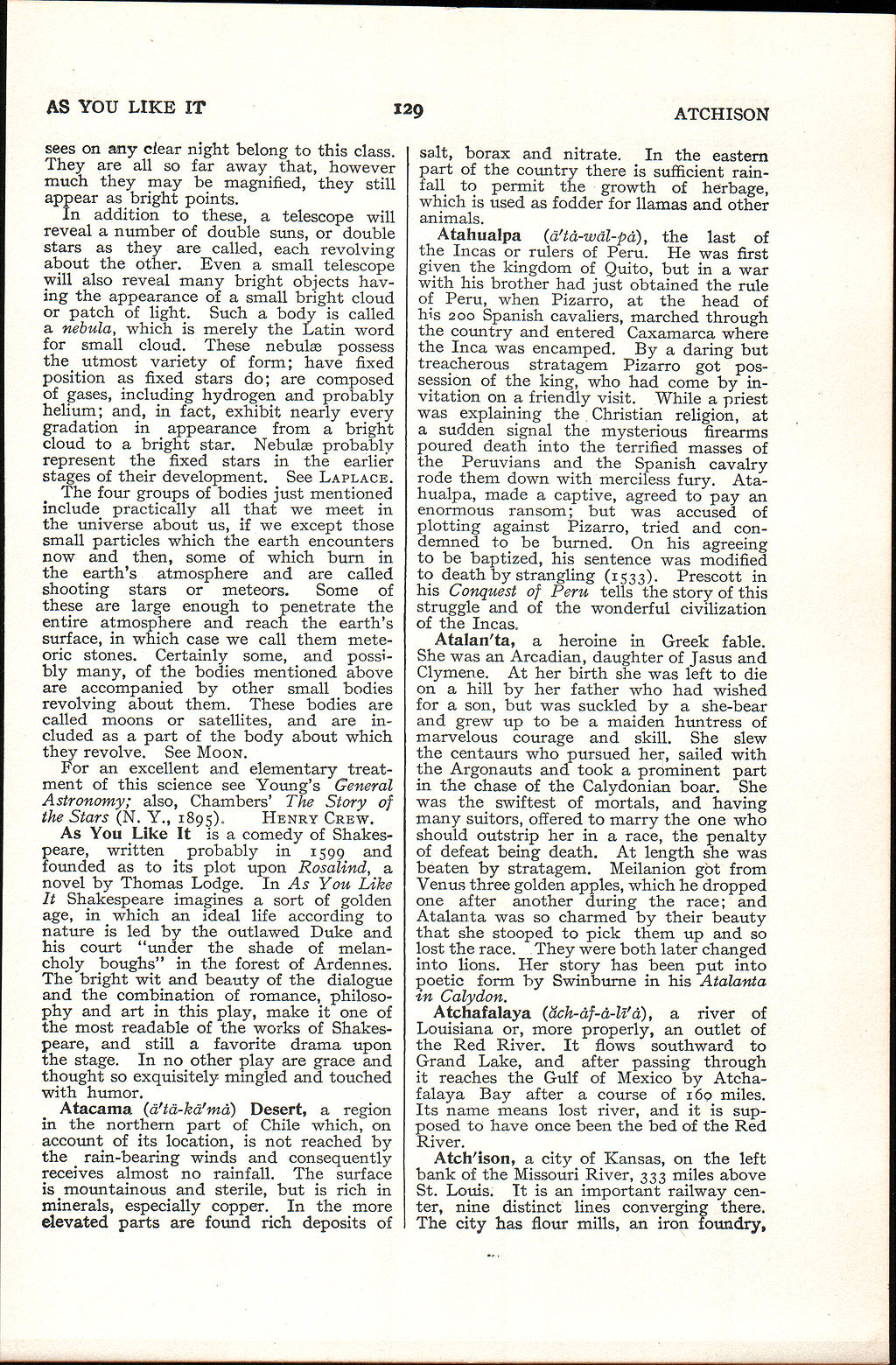sees on any clear night belong to this class. They are all so far away that, however much they may be magnified, they still appear as bright points.
In addition to these, a telescope will reveal a number of double suns, or double stars as they are called, each revolving about the other. Even a small telescope will also reveal many bright objects having the appearance of a small bright cloud or patch of light. Such a body is called a nebula, which is merely the Latin word for small cloud. These nebulae possess the utmost variety of form; have fixed position as fixed stars do; are composed of gases, including hydrogen and probably helium; and, in fact, exhibit nearly every gradation in appearance from a bright cloud to a bright star. Nebulae probably represent the fixed stars in the earlier stages of their development. See LAPLACE.
The four groups of bodies just mentioned include practically all that we meet in the universe about us, if we except those small particles which the earth encounters now and then, some of which burn in the earth's atmosphere and are called shooting stars or meteors. Some of these are large enough to penetrate the entire atmosphere and reach the earth's surface, in which case we call them meteoric stones. Certainty some, and possibly many, of the bodies mentioned above are accompanied by other small bodies revolving about them. These bodies are called moons or satellites, and are included as a part of the body about which they revolve. See MOON.
For an excellent and elementary treatment of this science see Young's General Astronomy; also, Chambers' The Story of the Stars (N. Y., 1895)
HENRY CREW
As You Like It is a comedy of Shakespeare, written probably in 1599 and founded as to its plot upon Rosalind, a novel by Thomas Lodge. In As You Like It Shakespeare imagines a sort of golden age, in which an ideal life according to nature is led by the outlawed Duke and his court "under the shade of melancholy boughs" in the forest of Ardennes. The bright wit and beauty of the dialogue and the combination of romance, philosophy and art in this play, make it one of the most readable of the works of Shakespeare, and still a favorite drama upon the stage. In no other play are grace and thought so exquisitely mingled and touched with humor.
Atacama (a'td-ka'md) Desert, a region in the northern part of Chile which, on account of its location, is not reached by the rain-bearing winds and consequently receives almost no rainfall. The surface is mountainous and sterile, but is rich in minerals, especially copper. In the more elevated parts are found rich deposits of
salt, borax and nitrate. In the eastern part of the country there is sufficient rainfall to permit the growth of herbage, which is used as fodder for llamas and other animals.
Atahualpa (a'ta-wal-pa), the last of the Incas or rulers of Peru. He was first given the kingdom of Quito, but in a war with his brother had just obtained the rule of Peru, when Pizarro, at the head of his 200 Spanish cavaliers, marched through the country and entered Caxamarca where the Inca was encamped. By a daring but treacherous stratagem Pizarro got possession of the king, who had come by invitation on a friendly visit. While a priest was explaining the Christian religion, at a sudden signal the mysterious firearms poured death into the terrified masses of the Peruvians and the Spanish cavalry rode them down with merciless fury. Atahualpa, made a captive, agreed to pay an enormous ransom; but was accused of plotting against Pizarro, tried and condemned to be burned. On his agreeing to be baptized, his sentence was modified to death by strangling (1533). Prescott in his Conquest of Peru tells the story of this struggle and of the wonderful civilization of the Incas,
Atalan'ta, a heroine in Greek fable. She was an Arcadian, daughter of Jasus and Clymene. At her birth she was left to die on a hill by her father who had wished for a son, but was suckled by a she-bear and grew up to be a maiden huntress of marvelous courage and skill. She slew the centaurs who pursued her, sailed with the Argonauts and took a prominent part in the chase of the Calydonian boar. She was the swiftest of mortals, and having many suitors, offered to marry the one who should outstrip her in a race, the penalty of defeat being death. At length she was beaten by stratagem. Meilanion got from Venus three golden apples, which he dropped one after another during the race; and Atalanta was so charmed by their beauty that she stooped to pick them up and so lost the race. They were both later changed into lions. Her story has been put into poetic form by Swinburne in his Atalanta in Calydon.
Atchafalaya (ach-df-d-U'd), a river of Louisiana or, more properly, an outlet of the Red River. It flows southward to Grand Lake, and after passing through it reaches the Gulf of Mexico by Atchafalaya Bay after a course of 160 miles. Its name means lost river, and it is supposed to have once been the bed of the Red River.
Atch'ison, a city of Kansas, on the left bank of the Missouri River, 333 miles above St. Louis. It is an important railway center, nine distinct lines converging there. The city has flour mills, an iron foundry,
